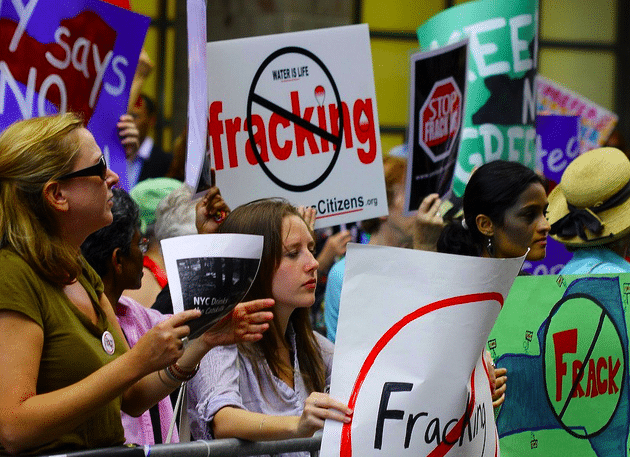The ongoing American Petroleum Institute (API) workshop “Commitment to Excellence in Hydraulic Fracturing” could be more simply titled “Commitment to Hydraulic Fracturing.” The API poses as an industry leader, working to develop best practices and strengthen operating procedures. But these days the sheep’s-clothing is starting to wear thin. After all, the “Commitment to Excellence” workshop has little to do with improving industry standards and everything to do with keeping the feds at bay.
The gas industry enjoys a number of exemptions from environmental statutes at the federal level. These exemptions, from laws like the Clean Air Act, the Safe Drinking Water Act and the Resource Conservation and Recovery Act, mean that oversight of the industry occurs at the state level, an arrangement that some feel facilitates rather than regulates gas drilling. So understandably, federal involvement is something the industry wants to avoid – and keynote speaker and former U.S. Senator Byron Dorgan was at the workshop to tell them just how to do that.
“I served in Congress 30 years. I can tell you people don’t just sit there on the floor of the Senate and say, ‘well, what can we regulate tomorrow?’ That’s not the way it works. The way it works is: people being to complain,” reports the Natural Gas Intelligence newsletter Shale Daily(login required). The federal government has no plans for a “full court press,” says Dorgan, but could with mounting pressure.
The two day event, culminating today, is taking place in Pittsburgh, PA, and is sponsored by an array of industry groups like the Independent Petroleum Association of America (IPAA), the Marcellus Shale Coalition (MSC), the Independent Oil and Gas Association (IOGA) and the American Natural Gas Alliance (ANGA) to name a few.
Representatives from companies like Halliburton, Devon Energy, Anadarko, ExxonMobil and ConocoPhillips and pro-industry groups like the Ground Water Protection Council and Commonwealth Foundation are gathered at this workshop to share their insights into the current status of fracking oversight.
The primary topic of the workshop is the evolution of fracking guidelines, an issue these organizations have every reason to take note of.
Citizen and environmental groups that are documenting sloppy drilling across the country point to the lack of unified national operating standards as its cause. Without federally mandated guidelines and enforcement, companies are left to drill and produce gas according to piecemeal state standards, which are often left to industry groups like the API to determine.
But this cozy arrangement will be short lived if operators don’t get their act together. “We will not be successful if we are ever identified by the worst practices of the lowest common denominator,” Dorgan warned the attendees.
Currently the API participates in setting industry standards for drilling procedures like fracking, which in many cases are adopted at the state and federal level. In the words of David Millar, API director of standards, “API standards represent industry’s collective wisdom on operational practices, developed and refined over many years.” Millar delivered a 15-minute standards overview at the workshop.
It should be shocking to hear that one of the biggest oil and gas lobby firms in the nation plays a role in setting the operational standards for the gas industry which funds and directs its initiatives. And, furthermore, trains state officials in their regulatory role.
Workshops of the “Commitment to Excellence” kind are really just cause for concern. They give companies and industry-funded lobby groups the opportunity to mingle, strategize and maintain their stronghold on the political system. The attendance of former senators and state officials at this event might just be further evidence of this.
Today’s program will end with an in-depth overview of the movement, or rather lack of movement, on the federal scale to oversee fracking. The still gaping Halliburton Loophole shows that industry efforts to keep federal involvement at a minimum have been effective.
Apparently the industry’s “Commitment” has paid off.
Subscribe to our newsletter
Stay up to date with DeSmog news and alerts







